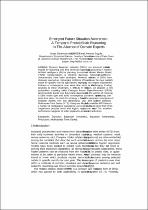 ResearchSpace
ResearchSpace
Emergent future situation awareness: a temporal probabilistic reasoning in the absence of domain experts
JavaScript is disabled for your browser. Some features of this site may not work without it.
- ResearchSpace
- →
- Research Publications/Outputs
- →
- Book Chapters
- →
- View Item
| dc.contributor.author |
Osunmakinde, I

|
|
| dc.contributor.author |
Bagula, A

|
|
| dc.date.accessioned | 2010-02-26T15:03:05Z | |
| dc.date.available | 2010-02-26T15:03:05Z | |
| dc.date.issued | 2009-04 | |
| dc.identifier.citation | Osunmakinde, I and Bagula, A. 2009. Emergent future situation awareness: a temporal probabilistic reasoning in the absence of domain experts. ICANNGA'09: International Conference on Adaptive and Natural Computing Algorithms, Kuopio, Finland, 23-25 April 2009, pp 340-349 | en |
| dc.identifier.isbn | 978-3-642-04920-0 | |
| dc.identifier.uri | http://www.springerlink.com/content/321u2518853402p2/ | |
| dc.identifier.uri | http://hdl.handle.net/10204/3958 | |
| dc.description | Copyright: Springer-Verlag Berlin Heidelberg 2009. This is the authors version of the it is posted here by permission granted by Springer-Verlag. The article is published in the Lecture Notes in Computer Science, Vol.5495(2009), pp 340-349 | en |
| dc.description.abstract | Dynamic Bayesian networks (DBNs) are temporal probabilistic models for reasoning over time which are rapidly gaining popularity in modern Artificial Intelligence (AI) for planning. A number of Hidden Markov Model (HMM) representations of dynamic Bayesian networks with different characteristics have been developed. However, the varieties of DBNs have obviously opened up challenging problems of how to choose the most suitable model for specific real life applications especially by non-expert practitioners. Problem of convergence over wider time steps is also challenging. Finding solutions to these challenges is difficult. In this paper, we propose a new probabilistic modeling called Emergent Future Situation Awareness (EFSA) which predicts trends over future time steps to mitigate the worries of choosing a DBN model type and avoid convergence problems when predicting over wider time steps. Its prediction strategy is based on the automatic emergence of temporal models over two dimensional (2D) time steps from historical Multivariate Time Series (MTS). Using real life publicly available MTS data on a number of comparative evaluations, our experimental results show that EFSA outperforms popular HMM and logistic regression models. This excellent performance suggests its wider application in research and industries. | en |
| dc.language.iso | en | en |
| dc.publisher | Springer-Verlag Berlin Heidelberg 2009 | en |
| dc.subject | Dynamic Bayesian networks | en |
| dc.subject | Multivariate time series | en |
| dc.subject | Temporal probabilistic reasoning | en |
| dc.subject | Natural computing algorithms | en |
| dc.subject | Artificial intelligence | en |
| dc.subject | Hidden markov model | en |
| dc.title | Emergent future situation awareness: a temporal probabilistic reasoning in the absence of domain experts | en |
| dc.type | Book Chapter | en |
| dc.identifier.apacitation | Osunmakinde, I., & Bagula, A. (2009). Emergent future situation awareness: A temporal probabilistic reasoning in the absence of domain experts., <i></i> Springer-Verlag Berlin Heidelberg 2009. http://hdl.handle.net/10204/3958 | en_ZA |
| dc.identifier.chicagocitation | Osunmakinde, I, and A Bagula. "Emergent future situation awareness: a temporal probabilistic reasoning in the absence of domain experts" In <i></i>, n.p.: Springer-Verlag Berlin Heidelberg 2009. 2009. http://hdl.handle.net/10204/3958. | en_ZA |
| dc.identifier.vancouvercitation | Osunmakinde I, Bagula A. Emergent future situation awareness: a temporal probabilistic reasoning in the absence of domain experts. [place unknown]: Springer-Verlag Berlin Heidelberg 2009; 2009. [cited yyyy month dd]. http://hdl.handle.net/10204/3958. | en_ZA |
| dc.identifier.ris | TY - Book Chapter AU - Osunmakinde, I AU - Bagula, A AB - Dynamic Bayesian networks (DBNs) are temporal probabilistic models for reasoning over time which are rapidly gaining popularity in modern Artificial Intelligence (AI) for planning. A number of Hidden Markov Model (HMM) representations of dynamic Bayesian networks with different characteristics have been developed. However, the varieties of DBNs have obviously opened up challenging problems of how to choose the most suitable model for specific real life applications especially by non-expert practitioners. Problem of convergence over wider time steps is also challenging. Finding solutions to these challenges is difficult. In this paper, we propose a new probabilistic modeling called Emergent Future Situation Awareness (EFSA) which predicts trends over future time steps to mitigate the worries of choosing a DBN model type and avoid convergence problems when predicting over wider time steps. Its prediction strategy is based on the automatic emergence of temporal models over two dimensional (2D) time steps from historical Multivariate Time Series (MTS). Using real life publicly available MTS data on a number of comparative evaluations, our experimental results show that EFSA outperforms popular HMM and logistic regression models. This excellent performance suggests its wider application in research and industries. DA - 2009-04 DB - ResearchSpace DP - CSIR KW - Dynamic Bayesian networks KW - Multivariate time series KW - Temporal probabilistic reasoning KW - Natural computing algorithms KW - Artificial intelligence KW - Hidden markov model LK - https://researchspace.csir.co.za PY - 2009 SM - 978-3-642-04920-0 T1 - Emergent future situation awareness: a temporal probabilistic reasoning in the absence of domain experts TI - Emergent future situation awareness: a temporal probabilistic reasoning in the absence of domain experts UR - http://hdl.handle.net/10204/3958 ER - | en_ZA |





